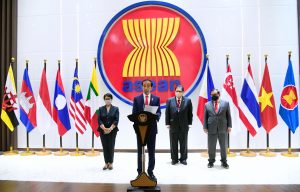
by Adithya Anil Variath 2 June 2021
Since Myanmar’s military seized power on 1 February 2021, the human rights scenario has deteriorated with the possibility of conflict escalating into a civil war. Over the past 100 days, human rights group have documented security force abuses, including enforced disappearances and detentions, killings of protesters, arbitrary arrests and secret court convictions.
Office of the High Commissioner for Human Rights (OHCHR) has reported that over 3,080 people are detained in undisclosed locations. There are also reports that 23 people have been sentenced to death following secret trials and unjust convictions by Myanmar’s military. According to the OHCHR, over 700 protesters have been killed in the brutal crackdown on peaceful demonstrations.
The post-coup d’etat legal changes have adopted by the military government erodes stability, rule of law and human rights. The State Administration Council appointed by the country’s military after it overthrew the elected civilian government revised the penal code on February 14 to insert a new provision – section 505A. The new section legitimises punishment for comments regarding the illegitimacy of the coup or the military government, among others. The new provision of the penal code criminalizes comments that “cause fear,” spread “false news, [or] agitates directly or indirectly a criminal offence against a Government employee.” Violation of 505A is punishable with up to three years in prison. Numerous journalists and activists have been detained and punished under this new amendment. UNESCO reported that at least 71 journalists have been arrested since the coup.
Apart from the penal code, changes have also been made to Law Protecting the Privacy and Security of Citizens (2017), Code of Criminal Procedure Amendment Law, Ward or Village Tract Administration Law (13/2/21) and Electronic Transactions Law (Law No 7/2021) to legitimate the widespread violations of human rights.
The UN Human Rights Council passed a resolution to end the violence and urged companies to end business relations with the military-controlled companies. However, the UN Security Council has not put in place an arms embargo and economic sanctions against the military due to China and Russia blocking it. Now, the international community looks up to the Association of Southeast Asian Nations (ASEAN) to act towards neutralising the situation and prevent mass atrocities.
The regional bloc has unusually committed itself to non-interference in internal matters thereby deprioritising the protection of human rights of people in Myanmar. The ineffectual response by the regional bloc may further deteriorate the crisis into a full-blown humanitarian catastrophe. The military regime has crumbled the economy and the World Food Programme has warned that up to 3.4 million people in the region would face hunger in the coming few months.
The ASEAN Member States can play a pivotal role in addressing the ongoing crisis. The ASEAN Charter in Article 1(7) reaffirms the duty of Member States “to promote and protect human rights and fundamental freedoms”. The ASEAN States are yet to unequivocally condemn all human rights violations in the region. While international law provides for the regional organisations to play an important role in implementing Responsibility to Protect (R2P), ASEAN States have not deployed tools like the accountability of crimes, economic sanctions, arms embargoes, etc.
ASEAN established the Intergovernmental Commission on Human Rights “to promote and protect human rights and fundamental freedoms of the peoples of ASEAN” and “to contribute to the realisation of the purposes of ASEAN as set out in the ASEAN Charter to promote stability and harmony in the region”. However, the regional bloc has shown inaction and silence when state-sponsored atrocities were committed on the Rohingyas in Myanmar.
The ongoing human rights violations due to undemocratic governance in Myanmar presents ASEAN and its regional human rights mechanism with a big test. The ASEAN members have to work together with OHCHR to investigate human rights violations in Myanmar and deploy R2P tools. Inaction by the regional bloc will only embolden Myanmar’s military and encourage more abuses having repercussions across Southeast Asia.
[Adithya Anil Variath is a lawyer and researcher. He writes frequently on issues of International Law and Policy, Foreign policy and AI.]
